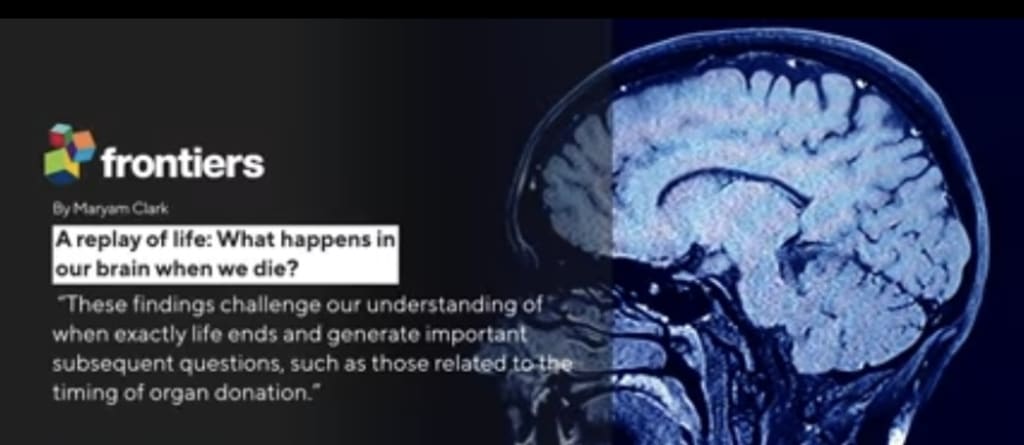What happens to our brains when we die?
what happens to our brain when we die

Ten years later, Martin is scheduled to be broadcasted at 8:00 p.m. Eastern on Saturday and available on demand through the CBS News app. A recent study delved into the long-standing question of what happens to our brains after death. The findings from this regulatory research suggest that close to the moment of death, rhythmic brain patterns may trigger the recall of important life memories. The co-author, a neuroscientist, believes that these results challenge our understanding of when life truly ends.
It was a completely accidental discovery. We had a patient with a sub-hematoma, which is bleeding between the skull and brain. During the operation, the patient experienced seizures, and we attached an EEG. Unfortunately, the patient went into cardiac arrest and passed away, leading to the first-ever recording of a dying human brain."
"We've heard about individuals who have had near-death experiences describing moments where important memories from their lives flashed before them. Is that what your research is about?"
"Based on just one case, we need to be cautious about making broad claims. However, our findings show brain activity in this dying patient was remarkably similar to healthy individuals who have undergone experiments and near-death experiences. The brain waves exhibited during this 30-second period before and after the heart stopped beating resemble those reported by people who had near-death experiences, hallucinations, and memory flashbacks. It's quite astonishing."
"The questions surrounding what happens when we die remain largely unanswered. The moment you recorded brain activity 30 seconds after the heart stopped beating, even after the patient was declared dead, opens up implications for understanding the timing of death and possibly impacting organ donations. Can you explain that further?"
"Traditionally, we associate the time of death with the moment the heart stops, indicated by a flat EKG curve. However, in this case, we recorded brain waves for an additional 30 seconds after the heart stopped. This period could either be related to the patient experiencing near-death phenomena or could be the response of dying nerve cells. We need more discussion and research to determine if comparing heart activity (EKG) to brain activity (EEG) could help define the actual time of death."
"It's remarkable that this accidental finding has opened up such important discussions. Moving forward, what are your plans for future research, and what questions do you hope to answer regarding the profound question of what happens when we die?"
"We have been hoping to find similar cases for further analysis rather than relying on just one instance. It's scientifically precarious to draw strong conclusions from a single case. By sharing our findings and generating conversations, I hope other scientists will come forward with similar cases for collaborative analysis, providing more insight into our discoveries. The implications of this research are vast, touching on the timing of death and the human experience of life and death. As a neurosurgeon, this research could also offer comfort to patients and their families, knowing that dying loved ones may experience pleasant memories during their final moments."
"It's indeed a fascinating and impactful study. I look forward to the potential future findings and discoveries.
During death, your body's vital functions stop entirely. Your heart no longer beats, your breath stops and your brain stops functioning. Studies suggest that brain activity may continue several minutes after a person has been declared dead. Still, brain activity isn't the same as consciousness or awareness
However, a new study published to Frontiers in Aging Neuroscience suggests that your brain may remain active and coordinated during and after the transition to death, and may even be programmed to orchestrate the whole ordeal.
When an 87-year-old patient developed epilepsy, Dr Raul Vicente of the University of Tartu, Estonia and colleagues used continuous electroencephalography (EEG) to detect the seizures and treat the patient. During these recordings, the patient had a heart attack and passed away. This unexpected event allowed the scientists to record the activity of a dying human brain for the first time ever.
Findings ‘challenge our understanding of when exactly life ends’
“We measured 900 seconds of brain activity around the time of death and set a specific focus to investigate what happened in the 30 seconds before and after the heart stopped beating,” said Dr Ajmal Zemmar, a neurosurgeon at the University of Louisville, US, who organised the study.
“Just before and after the heart stopped working, we saw changes in a specific band of neural oscillations, so-called gamma oscillations, but also in others such as delta, theta, alpha and beta oscillations.”
Brain oscillations (more commonly known as ‘brain waves’) are patterns of rhythmic brain activity normally present in living human brains. The different types of oscillations, including gamma, are involved in high-cognitive functions, such as concentrating, dreaming, meditation, memory retrieval, information processing, and conscious perception, just like those associated with memory flashbacks.
About the Creator
Enjoyed the story? Support the Creator.
Subscribe for free to receive all their stories in your feed. You could also pledge your support or give them a one-off tip, letting them know you appreciate their work.





Comments
There are no comments for this story
Be the first to respond and start the conversation.